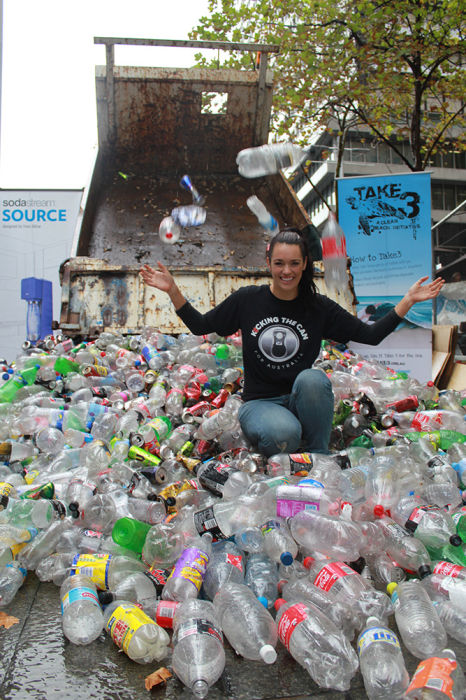
April saw a series of colourful events across Sydney and beyond, highlighting the problem of litter and waste. The tour started with the dumping of 4,000 drink containers in Martin Place (with the support of City of Sydney Lord Mayor Clover Moore). It continued to a number of community “can kicking” events in Sydney, Newcastle and Wollongong, and finished with an attempt to net and remove waste from Darling Harbour which was thwarted by the Sydney Harbour Foreshore Authority.
The tour was a part of the “Kicking the Can” campaign for the introduction of a national container deposit system (CDS), a 10c refundable deposit on beverage containers including plastic and glass bottles and aluminum cans. The campaign is an initiative of the Boomerang Alliance, a coalition of 27 organisations including environment groups, community groups, and the peak council body Local Government NSW.
Currently, 8 billion bottles, cans and containers are wasted in Australia, over half of all the containers that are consumed annually. They end up not only as landfill, but also as litter, creating environmental problems for our streets, parks, bushland, beaches and waterways.
“Fixing the litter and waste problem is not just about more recycling bins and bigger litter management plans,” said National Policy Director with the Boomerang Alliance and Newtown resident Dave West. “A container deposit system effectively puts a value on litter and creates an infrastructure for containers to be recovered as valuable resources.”
CDSs are successfully operating in countries across the world. Experience from the longstanding CDS in South Australia and the more recent scheme in the Northern Territory also shows clear environmental benefits. “Around 90 per cent of beverage containers are recycled in South Australia,” said West. “And monitoring in the Northern Territory indicates a 40 per cent reduction in all litter types except for cigarette butts.”
Moreover, refundable deposits also provide opportunities for community groups to raise funds through social enterprise. “Groups like the Scouts, Surf Life Saving and Apex benefit in South Australia, for example the Scouts run recycling depots, and Aboriginal communities in the Territory are starting to set up recycling businesses,” said West. “A national CDS would create a new $400 million industry, and the community sector could have 60 per cent of the market share.”
Waste management is a state government matter, and regulations governing trade between states impose constraints on unilateral state action, as shown by the embattled Northern Territory CDS. Therefore the state and federal governments all need to agree to establish a national scheme. It is a move that is being actively opposed by several major beverage corporations, especially Coca-Cola Amatil. In the coming months, state and federal environment ministers are expected to complete a five-year study on whether to adopt a national CDS.
In the meantime, the Kicking the Can campaign continues.





